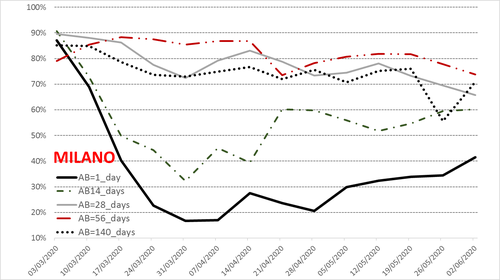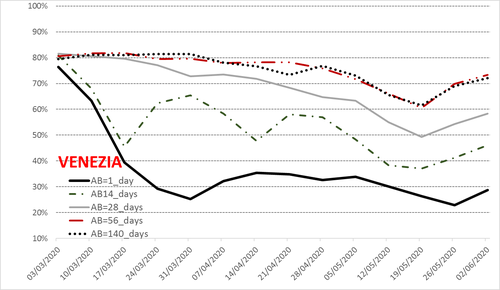Report 02/06/2020
The reopening of regional borders boosts confidence in both segments

Milan: the mobility between regions boosts confidence to business tourism.
The reopening of regional borders of June, the 3rdenhances hotel managers’ confidence, increasing the share of hotels in Milan that are active on the market, or that are planning to open in mid-June. The Hotel Activity Indices for the very short (AB1_day) and short-term (AB14_days) are both growing, even though they just represent 40% and 60% of the total offer, respectively. The initial uncertainty about a possible delay in the access of tourist flows to Lombardy (the region where Milan is located) may in part justify this difference. In addition, the time required to adopt health and safety protocols and, at the same time, a wait-and-see attitude to check the dynamics of reservations may affect this difference.
The Hotel Activity indices at 28 (AB28_days) and 56 days (AB56_days) continue to decline. In contrast, the 140-day index (for bookings in October) grows, with the share of active hotels increasing from 60% of last week to 70%. The convergent trend of the 28, 56 and 140-day indices seems to indicate that many of the hotels that will not reopen in the summer months, from June to September, will open in Autumn, the central period for business tourism.

Venice: strong recovery for the leisure segment.
The Hotel Activity Index improves, regardless of the advance booking window considered. Unlocking regional borders has encouraged the reopening of many hotel structures also in Venice. Almost 30% of the hotels in Venice are already open, while about 50% plan to reopen from mid-June. At the beginning of July, the percentage of hotels offering rooms online rises to 60%, whereas hotels offering rooms in late July or October exceed 70%. In a city where incoming tourism plays a crucial role, the persistent national boarder shutdown is expected to have deeply affected the reopening decision of a large share of hotels.